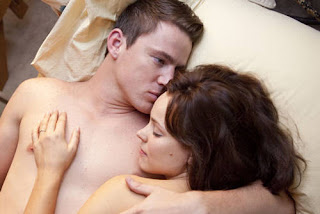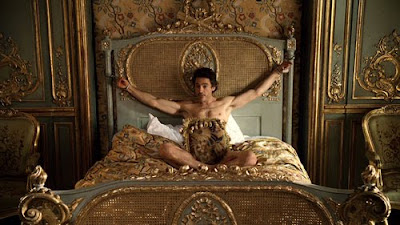
Director: Woody Allen
Cast: Owen Wilson, Rachel McAdams, Adrien Brody
Alison PillCarla Bruni-Sarkozy, Corey Stoll, Kathy Bates
Kurt Fuller, Léa Seydoux, Marion Cotillard
Mimi Kennedy, Tom Hiddleston
From its opening scene, Midnight in Paris establishes itself as a love song: we see how a series of shots of the city comprise a verse that thrills us because of its familiarity (ooh it's Notre Dame! ooh it's Place Vendome!) and despite its otherworldly beauty.
Paris is one of those cities that becomes universal because of the feelings they inspire even if you have never visited them. Tons of films have been set in Paris, tons of romances have been set there as well and to those less inclined by emotions, the French capital has also been the stage for some of the most revolutionary cultural movements in the world.
It makes absolute sense then, that Woody Allen would fall head over heels for it. Not since Manhattan had he shown such passion for a place as he does in this film. Structured like his iconic ode to New York City, Midnight in Paris is formed by a bookend in which we first develop the crush, a large plot development in which we suffer through the ups and downs of love and a final thought that reminds us, not only of our insignificance but about the immortality of beauty.
Throughout the film, Allen, aided by cinematographer Darius Khondji's breathtaking framing, reminds us that Paris will remain even after we're gone.
Take for example the scene in which we meet Gil Pender (Wilson), our protagonist. We hear him talking to his fiancee Inez (McAdams) about the beauty and romanticism of Paris but we can not see either of them. What we see instead is a huge pond filled with fragile water lilies. For a moment, we're not even sure if we're watching a painting or an actual real life image, Then Gil mentions something about Monet and our mind clicks, but so does the camera and we move to find ourselves in front of the people we're about to meet.
In several other scenes throughout the movie, first we see places and things and only then do the characters enter the scene. The camera is sometimes placed before them, as if suggesting the characters need to catch up with time - and wondering if they ever will be able to do it - and sometimes it seems to wander about trying to take in the riches of a city that's too overwhelming for a films's running time.
The subject of catching up with time might be the plot's biggest preoccupation, as Gil finds himself yearning to live in a different place as his writer's block increases. After working as a Hollywood hired hand- and being quite successful at it- he's trying out a novel for the first time. His trip to Paris is meant to inspire him but all he gets are insults from Inez and her parents (the pitch perfect Kennedy and Fuller).
Things get worse when they run into Paul (Sheen) and Carol (Arianda), two friends of Inez who tag along everywhere they go. He's a pseudo-intellectual who knows it all on the surface, she's the loving companion who nods at his every word.
Allen never has any problem revealing to us that the world that surrounds Gil (who in this film is the "Woody Allen character") is truly atrocious. As he usually does, he has no problem affirming that this is a misunderstood man, perhaps a bit too sensitive to be surrounded by the shrewd beings he knows. Allen has never been good at hiding his disdain for bourgeois apathy and while his characters are never exactly saints of any kind, he has always excelled at making us like them.
Gil for example seems to breathe by inertia, we're meant to dislike Inez (the things she says often make you gasp) but we're not supposed to be rooting for Gil just yet. He needs to earn our liking, he needs to achieve a breakthrough.
Woody provides him this opportunity by relying on a fantastical twist that resembles what he did in his brilliant The Purple Rose of Cairo, as in that occasion, everything happens so fast that we're unable to try and reason. Anyone who cared to deconstruct either movie by ways of physics and probability could probably accuse of them of being truly preposterous. During one scene Inez's mother describes a movie she saw as "infantile" and lacking in any believable qualities, but she doesn't deny it had charm (is she talking about the movie she's in?).
However Allen becomes the ultimate alchemist, turning the dullness of the quotidian into magic that defies the most complicated visual effects. Midnight in Paris gives him an opportunity to bask in his love for the Lost Generation and all things 20s, giving us glimpses of a city where you could run into characters the likes of Hemingway (a phenomenal, scene stealing Stoll), F. Scott Fitzgerald (Hiddleston) and Gertrude Stein (Bates) among others.
Leading us in this tour of a golden era is Marion Cotillard, playing the woman who captures Gil's heart. To reveal the many twists and turns in the movie would be to rob the audience of what can only be called utter pleasure. In the past Allen has expressed his love for classic things, however this might be the first time when he seems to find his voice through others.
While sometimes it might seem like a film meant for culture snobs (and what Allen movie isn't?) Midnight in Paris is also remarkable for its unaware passion for the arts. When Gil says to a character "you take art groupie to a whole new level" he might as well be talking about Allen and the movie.
It's no coincidence that the film seems to be based on the theory that places of great antiquity and history are forever plagued with the ghosts of those who once lived there. At many times during the film there are mentions of the main character in Gil's novel; a young man who owns a nostalgia shop, the places where you can buy old records and Shirley Temple memorabilia.
For some this is an enchanting concept (Cotillard's character is "hooked" by it) while others find it creepy and childish. "Nostalgia is denial" says Paul condescendingly, while Gil looks away finding himself in a place far away from judgment.
The movie toys with the possibility of transporting yourself to a time where everything can be perfect and Allen approaches his everlasting obsession with mortality in a way that makes the heart ache and puts a smile on your face.
We realize eventually that Allen is the shop vendor mentioned so much, he's the one always selling us nostalgia, whether it be his use of music, artistic references or the affected way in which his characters talk (the use of words like "pseudo-intellectual", "lovely" and "erotic" usually give his screenplays away).
Midnight in Paris can be read through countless layers, the magic of its ensemble alone is enough to warrant an essay but like the greatest art what's easiest to discuss, perhaps because it inspires excited, clumsy eloquence, is the feeling that it leaves you with: something that resembles the warmth of a good meal and the exhilarating joy of being in love.
After his last movie which failed to invite us into its dark world, in this one a character reminds Gil that a writer can not succumb to despair, his duty is to find an antidote to the emptiness of existence. Woody Allen seems to have taken this advice and Midnight in Paris is the kind of movie that reminds us that heaven might be a plane ride away.

























